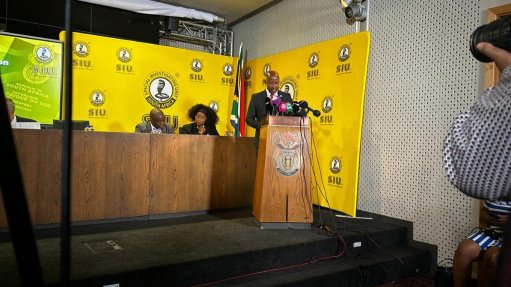Procurement clarity and prosecutions key to tackling construction site disruptions









SIHLE ZIKALALA Contractors must refuse to pay bribes to public officials and extorters. We must protect whistleblowers, and ensure that people who indicate potential for disruption are protected
EUAN MASSEY We need to identify the target enterprises who the 30% will be awarded to, how it will be awarded, and how the target will be achieved
GREGORY MOFOKENG We've had instances where contractors had to go to court to secure court interdicts because the police did not do what we expected them to do
SIHLE ZIKALALA Contractors must refuse to pay bribes to public officials and extorters. We must protect whistleblowers, and ensure that people who indicate potential for disruption are protected
EUAN MASSEY We need to identify the target enterprises who the 30% will be awarded to, how it will be awarded, and how the target will be achieved
GREGORY MOFOKENG We've had instances where contractors had to go to court to secure court interdicts because the police did not do what we expected them to do
ECONOMIC BLOWBACK About R68-billion has been lost to the South African economy as a result of construction site disruptions since 2019
Public Works and Infrastructure Minister Sihle Zikalala has emphasised the importance of unity in condemning and addressing construction site disruption and extortion affecting the industry.
“It is important that we act together to root out these illegal practices, which are driving away investment in the local construction and property sector. We’re grappling with a challenge that we characterise as a lack of social protection, which permeates and gives rise to criminality,” stated Zikalala.
The Minister spoke during Construction Alliance South Africa’s recent webinar hosted by Creamer Media, focusing on the theme of navigating construction site disruptions that are plaguing South Africa.
Many of these construction site disruptions have been in KwaZulu-Natal, with the accumulated cost of these disruptions estimated at R68-billion.
Cause and Effect
The Minister highlighted several possible reasons for the disruptions, including a sense among some previously disadvantaged South Africans that they remain marginalised and excluded from economic opportunities.
That said, he also stressed the need to arrest those involved in construction site disruptions, and reported that about 605 cases have been opened.
Despite these arrests, however, he admitted that there has been a lack of prosecution and sentencing.
Law firm MDA Attorneys director Euan Massey highlighted that criminal elements were taking advantage of uncertainty regarding the 2017 Preferential Procurement Regulations, which outline a goal for setting aside 30% of a project for local participation.
“There is a misunderstanding regarding the word ‘local’. Is local South African? Is it provincial? Is it municipal or is it related to the area adjacent to sites where the work has been performed? This has allowed mafia-like organisations to extort money from contractors and disrupt projects.”
Massey also argued that when these regulations were first enacted, employers passed down these procurement responsibilities to contractors, who were left to their own devices to implement the 30% requirement.
Only recently has it been acknowledged that commitment is required from all role- players, including State-owned entities, to achieve the requirement.
“We can’t have projects where we have a blanket 30% requirement, where the work that’s being executed just doesn’t accommodate that requirement.
“We need to identify the target enterprises to which the 30% will be awarded, how it will be awarded and how the target will be achieved. This will ensure that money is awarded to people and entities who create new businesses and grow the economy,” Massey added.
South African Women in Plumbing and Trades representative Kile Mteto stressed the negative impact site disruptions were having on increasing business costs for small, medium-sized and microenterprises (SMMEs), particularly women-owned entities.
She also noted that site disruptions prevent skills development opportunities for SMMEs.
Black Business Council VP Gregory Mofokeng reiterated the direct impact that construction site disruptions are having on economic growth and job creation, even for people not employed in the industry.
The construction industry is actively cooperating with the South African Police Service (SAPS), but the situation has worsened.
“Contractors have had to secure court interdicts. Beyond the policy inactivity, as contractors, we have also tried other means of bringing about law and order to our sites.
“We have to rely on police to make sure interdicts are enforced. What we’re not seeing from law enforcement is increased activity in making sure that these criminals are arrested so that they can be duly sentenced,” Mofokeng added.
Massey also argued during the webinar that interdicts are a reactive measure, with limited success. While they can be successful against individuals, construction-mafia organisations replace such individuals, enabling disruptions to continue.
Mofokeng also noted that government representatives have been co-opted by these organisations, particularly at the local level, as criminals involved in extortion travel to construction sites to talk to the main contractors with a government councillor.
“Some councillors are involved in encouraging people to stop projects simply because certain individuals and the community are not directly benefiting.”
Meanwhile, Mofokeng added that the Black Business Council is hopeful that the training of more police officers can contribute to addressing site disruptions, and that they are deployed into areas where construction projects are implemented as a deterrent.
“We are considering amending industry contracts to protect the interests of contractors and mitigate financial risks. There is an increase in threats to our staff, so we’ll have to devise strategies to see how do we secure the safety of our personnel on and off site,” Massey said.
Although four standard form contracts are used in the construction industry, only one – a locally produced general conditions of contract for civil engineering contracts – deals with local procurement.
“What we’ve seen is that organisations like the South African National Roads Agency have amended the International Federation of Consulting Engineers international form of contract.
“They’ve amended their contract to allow for a lead-in period to promote local participation, which allows for dealing with site disruption when it does occur,” he added.
Capacity Decline
Institute for Security Studies head of the justice and violence prevention programme Gareth Newham highlighted a deterioration in the past decade of State intelligence and law enforcement capabilities, partly as a result of State capture.
“This began with the shutting down of the Scorpions unit in 2008, which was good at tackling corruption and dealing with complex and organised crime networks.
“Attempts to neutralise security agencies continuing from 2009 until around 2018 depleted the capabilities of State security agencies. Between 2012 and 2020, the ability of the SAPS to solve murder dockets dropped by 55%, despite its budget growing by 86% in this period.
“Currently, we have over 180 000 people in the SAPS, with a current yearly budget of over R108-billion. However, only 14.5% of murder dockets are solved.”
The construction sector was also likely targeted, owing to the perception that construction projects are associated with large budgets.
“The most important intervention will have to be improving our law enforcement and intelligence capabilities to deal with these syndicates.
“Until there is a very real chance of the State making sure that these syndicates are held accountable, it is unlikely that other interventions will do much to adequately and sustainably reduce this challenge.”
Despite a number of arrests already being made, Newham stressed the importance of arresting criminals “higher up the value chain”.
There must also be dedicated components of the National Prosecuting Authority guiding and working with investigators so that instigators can be brought before the courts urgently, he added.
Backbone of the Economy
Zikalala stressed that construction is “the backbone of the economy and social development”.
The Department of Public Works is coordinating the “unleashing” of infrastructure development through Infrastructure South Africa to expedite and implement projects.
“We’re expediting this through the construction unit in our department, but various other departments also are engaged in unleashing infrastructure.
“Large companies must support SMMEs. We must address collusion amongst large companies, as collusion leads to higher project costs for government and the project client.”
He also stressed the need for larger companies to remain committed to the transformation of South Africa and the built environment industry, and, in general, supporting SMMEs, young workers, women and disabled people.
This comes in addition to ensuring that the policy commitment of localisation is preserved.
“When we say that 30% must be allocated to local companies if the contract is above R30-million, this must be done by all. We must continue to work together to meet the targets agreed upon in the transformation charter of the built environment.
“We must then ensure that, if projects are executed, those projects are consulted in a way that ensures that stakeholders, such as municipalities, are briefed.”
The Department of Public Works will, therefore, strengthen a social facilitation unit in the department.
Zikalala added that, if large companies are conducting construction work, they should make an effort to subcontract portions of the work to SMMEs.
“This is why we’re engaging with the Construction Industry Development Board (CIDB) to train companies that are in the CIDB and provide relevant skills to them.”
Government has implemented an organised crime investigation services unit, as a result of an intervention by President Cyril Ramaphosa.
The Department of Public Works is also implementing a social facilitation unit that will be able to intervene and ensure community participation.
This unit will assist with stakeholder involvement in construction projects, and with effective implementation of project management. Once the department receives the necessary reports, it will also be able to take disciplinary action against councillors involved in site disruptions.
“We need a platform where we coordinate together in each area, and that’s why we need to use the District Development Model as an anchor for the coordination, so that we’re able to intervene timeously and avoid any disruption or delay.
“The Public Procurement Bill is in consultation, and the Minister of Finance, Enoch Godongwana, will release it soon for public comment.”
Zikalala added that construction has multiple effects and supports many sectors, and that it makes it easier to attract investment.
“We must ensure that those who are found to be on the opposite side of this framework are dealt with according to the law.
“We want to support all associations that represent stakeholders or companies in the construction industry, who also want to continue engaging, and tap from their understanding and practical experience. Let’s turn South Africa into a giant construction site, and make this industry work for all and leave no one behind,” he concluded.
Article Enquiry
Email Article
Save Article
Feedback
To advertise email advertising@creamermedia.co.za or click here
Press Office
Announcements
What's On
Subscribe to improve your user experience...
Option 1 (equivalent of R125 a month):
Receive a weekly copy of Creamer Media's Engineering News & Mining Weekly magazine
(print copy for those in South Africa and e-magazine for those outside of South Africa)
Receive daily email newsletters
Access to full search results
Access archive of magazine back copies
Access to Projects in Progress
Access to ONE Research Report of your choice in PDF format
Option 2 (equivalent of R375 a month):
All benefits from Option 1
PLUS
Access to Creamer Media's Research Channel Africa for ALL Research Reports, in PDF format, on various industrial and mining sectors
including Electricity; Water; Energy Transition; Hydrogen; Roads, Rail and Ports; Coal; Gold; Platinum; Battery Metals; etc.
Already a subscriber?
Forgotten your password?
Receive weekly copy of Creamer Media's Engineering News & Mining Weekly magazine (print copy for those in South Africa and e-magazine for those outside of South Africa)
➕
Recieve daily email newsletters
➕
Access to full search results
➕
Access archive of magazine back copies
➕
Access to Projects in Progress
➕
Access to ONE Research Report of your choice in PDF format
RESEARCH CHANNEL AFRICA
R4500 (equivalent of R375 a month)
SUBSCRIBEAll benefits from Option 1
➕
Access to Creamer Media's Research Channel Africa for ALL Research Reports on various industrial and mining sectors, in PDF format, including on:
Electricity
➕
Water
➕
Energy Transition
➕
Hydrogen
➕
Roads, Rail and Ports
➕
Coal
➕
Gold
➕
Platinum
➕
Battery Metals
➕
etc.
Receive all benefits from Option 1 or Option 2 delivered to numerous people at your company
➕
Multiple User names and Passwords for simultaneous log-ins
➕
Intranet integration access to all in your organisation


























